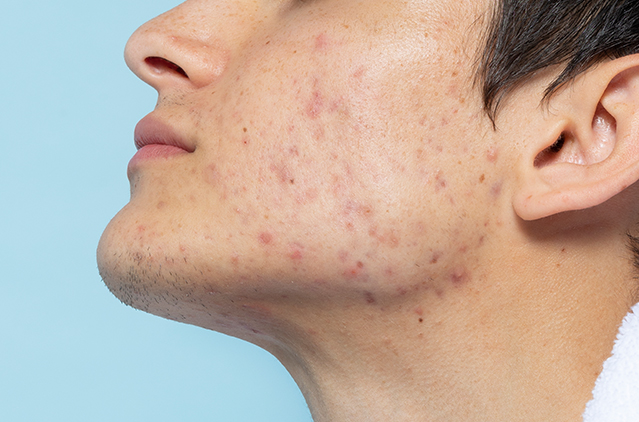
Acne is a prevalent skin ailment that impacts millions of individuals globally. It is a universal phenomenon that affects people of all ages, genders, and races without distinction. Acne is a frustrating condition that has a detrimental impact on our self-esteem and mental health. This blog explores acne, including its causes, remedies, and preventative measures. Continue reading to find out more.
Understanding Acne
It would be beneficial to acquire some knowledge about acne before deciding how to treat it. The medical term for acne is “acne vulgaris.” It mostly affects the skin’s sebaceous glands, which produce oil. It appears as skin lesions, such as blackheads, whiteheads, pustules, and pimples. Most often, the cheeks, back, shoulders, and chest are affected by acne.
Acne is a multifactorial condition caused due to several reasons. Some of the causes of acne include-
- Hormonal fluctuations
Changes in the hormonal levels that happen during puberty, pregnancy, menstruation and menopause play a significant role in increasing sebum production. This leads to outbreaks of acne. - Excess Sebum and Clogged Pores
The sebaceous glands produce sebum, which is a requisite for normal skin texture. However, in certain cases, the sebum production is increased to such an extent that it begins clogging the pores along with the dirt and grime. Clogged pores lead to acne development. - Bacterial Overgrowth
Clogged pores and increased sebum production lead to the overgrowth of naturally occurring bacteria on the skin. This leads to a severe form of acne where there are pus-filled eruptions on the skin. - Genetics
A family history of acne can increase your susceptibility towards the condition.

Effective and Safe Treatment Options For Acne
From home remedies to a healthy lifestyle to prescription medicines, here are some of the best anti-acne treatments.
From home remedies to a healthy lifestyle to prescription medicines, here are some of the best anti-acne treatments.
OTC Medicines
- Topical Treatments-
For mild acne, over-the-counter topical medications with sulphur, salicylic acid, or benzoyl peroxide work well. These components aid in pore cleaning, irritation reduction, and bacterial eradication that causes acne. - Cleansers And Exfoliants-
Pore obstruction can be avoided by using gentle cleansers and exfoliants to get rid of extra oil, debris, and dead skin cells. Seek out products that don’t contain elements that cause acne to worsen. - Spot Treatments-
Sulphur or tea tree oil-based targeted spot treatments can quickly shrink individual pimples and lessen their redness.
Prescription Medicines
- Topical Retinoids-
Topical retinoids, such as tretinoin and adapalene, are derived from vitamin A and normalise skin cell turnover, preventing clogged pores and lowering inflammation. - Topical Antibiotics-
Antibacterial gels or creams with erythromycin or clindamycin as a component can help fight acne-causing germs and lessen inflammation. - Oral Medicines-
To treat bacterial overgrowth and inflammation in moderate to severe acne, doctors may prescribe oral antibiotics (such as doxycycline or minocycline). Women’s hormones can also be regulated by oral contraceptives. - Isotretinoin-
Isotretinoin is a strong oral drug used to treat severe, unresponsive acne. It prevents clogged pores, lowers oil production, and has long-term remission benefits. However, it needs to be closely watched because of possible adverse effects.
Professional Cosmetic Treatments
- Chemical Peels-
Alpha hydroxy acid (AHA) and beta hydroxy acid (BHA)–containing chemical peels can exfoliate skin, clear clogged pores, and improve pigmentation and acne scars. - Microdermabrasion-
With microscopic crystals, this minimally invasive technique exfoliates the skin, clearing clogged pores and enhancing skin texture. - Laser Therapy
Acne is treated with various laser procedures that decrease oil production, eradicate germs, and accelerate skin healing. Both acne scars and inflammatory acne respond well to these therapies.
Lifestyle Modifications Home Remedies
- Healthy Diet- Overall skin health can be supported by eating a balanced diet high in fruits, vegetables, lean meats, and whole grains. Reducing sugar, dairy, and high-glycemic meals may also aid in the reduction of acne.
- Practising Good Hygiene– Pore blockage can be avoided and acne flare-ups can be decreased by regularly washing the skin with a mild cleanser, avoiding vigorous scrubbing, and using non-comedogenic skincare products.
- Stress Management– Acne can be made worse by stress, so practising stress-reduction methods like mindfulness, yoga, meditation, or exercise can help.
- Avoiding Irritants– Reduce your exposure to substances that may aggravate acne, such as strong chemicals, strong perfumes, and heavy makeup.
Home Remedies
Home remedies are easily available and frequently affordable options. Natural substances like tea tree oil, honey, and aloe vera have antibacterial and anti-inflammatory qualities. The antibacterial qualities of tea tree oil can aid in the fight against bacteria that cause acne, while the antibacterial and soothing qualities of honey can aid in wound healing by lowering inflammation. Renowned for its restorative qualities, aloe vera helps soothe inflamed skin and lessen acne-related redness.
Home Remedies
Home remedies are easily available and frequently affordable options.
Natural substances like tea tree oil, honey, and aloe vera have antibacterial and anti-inflammatory qualities. The
antibacterial qualities of tea tree oil can aid in the fight against bacteria that cause acne, while the
antibacterial and soothing qualities of honey can aid in wound healing by lowering inflammation. Renowned for its
restorative qualities, aloe vera helps soothe inflamed skin and lessen acne-related redness.
How Can I Clear My Acne Fast?
Swift acne clearance necessitates a proactive and focused strategy. To begin, cleanse the skin twice a day with a mild cleanser to get rid of extra oil and pollutants. Spot treat aggressive breakouts using spot treatments containing chemicals like salicylic acid or benzoyl peroxide to destroy acne-causing germs and relieve irritation. To prevent further blockage of pores, use non-comedogenic cosmetics and oil-free moisturisers. Include exfoliation in your regimen to remove dead skin cells and avoid clogged pores. To promote general skin health, keep yourself hydrated, eat a balanced diet, and control your stress levels. For quicker and more efficient clearance in extreme situations, see a dermatologist about prescription drugs or professional treatments.
Kosmoderma’s Niacinamide Acne and Blemish Control Serum
Kosmoderma’s Niacinamide Acne and Blemish Control Serum is a revolutionary product by Kosmoderma is one of the best anti-acne treatments available today. It is a unique blend of several ingredients that not only help to cure/avoid acne breakouts but also give clearer skin with an even tone. It has niacinamide as the active ingredient. Also known as Vitamin B3, niacinamide is an excellent ingredient that has anti-inflammatory, antioxidant, and sebum-regulating properties. This serum also contains natural ingredients like turmeric, ginger root extract and aloe vera. Turmeric is a natural antibiotic; ginger calms the inflamed skin while aloe vera soothes the redness and pain. Together these natural ingredients are strong antioxidants that reduce the signs of ageing too.
Acne is a common skin disorder that is hard to treat because of its many underlying causes. Gaining a deeper understanding of it will enable you to manage the existing crop and prevent an outbreak by taking the necessary precautions. Acne can be effectively treated with easy steps like cleaning, exfoliating, sunscreen protection, eating a healthy diet, and managing stress. There are also several natural treatments for acne. Some of the biggest game-changers in the treatment of acne include tea tree oil, aloe vera, and green tea extracts. Several products that are readily available at medical stores can also be used to control acne. A dermatologist appointment is necessary for severe acne outbreaks.
Acne can be overcome with perseverance and a committed skincare regimen. Acne may seem like a powerful foe, but with the appropriate information and tools, you can defeat it and get a clear, balanced skin tone, as well as a great deal of self-confidence.



